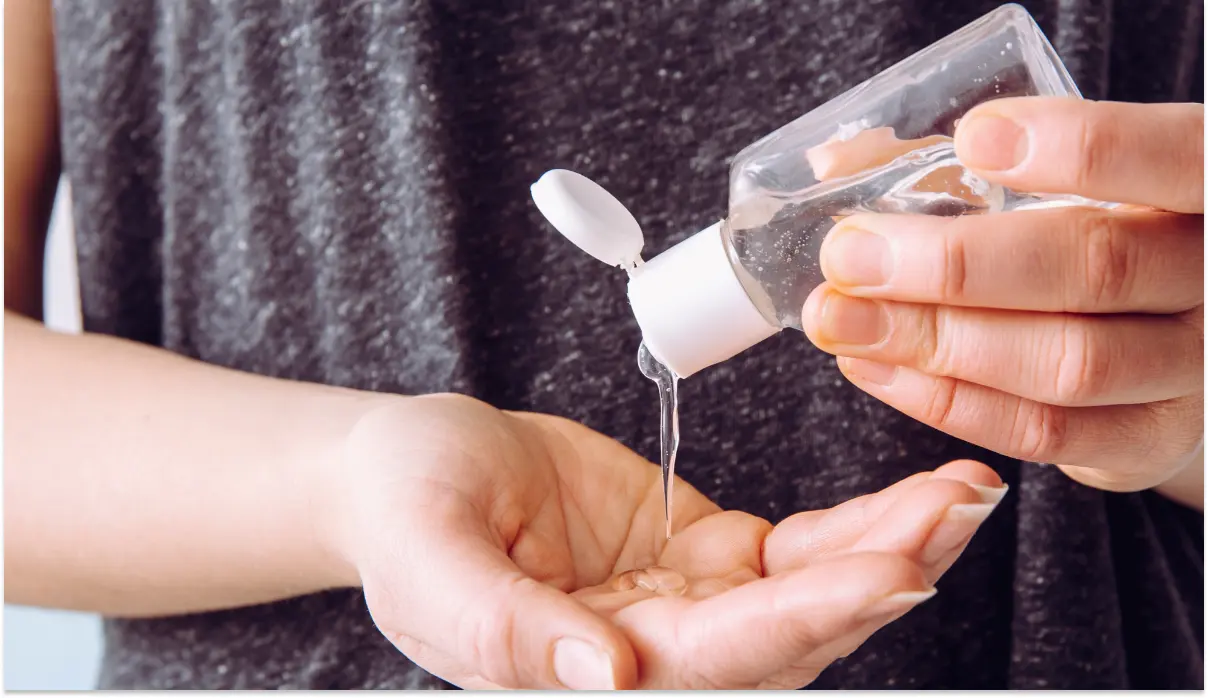Which Is Better for Hand Hygiene? Soap and Water Vs. Hand Sanitizer

Do you want to know the easiest way to tell if your hands are clean? Sing the “Happy Birthday” song twice while you lather and wash your hands with soap. It takes about 20 seconds.
By Rich Feczko: National Director of Systems, Standards, Innovation & Global Support
Do you want to know the easiest way to tell if your hands are clean? Sing the “Happy Birthday” song twice while you lather and wash your hands with soap. It takes about 20 seconds.
Stopping the spread of germs and diseases that can be transmitted by others is a common health concern. We are often told the benefits of washing our hands with soap and water – the Centers for Disease Control and Prevention (CDC) recommends washing with soap and water as the best possible way to stay clean. Yet, grocery stores, office buildings, and other public places now provide hand sanitizer while parents often carry disposable wipes to clean their children’s hands in restaurants or after any outdoor activity.
Indeed, the hand sanitizer vs. hand-washing debate touches areas that go far beyond hospitals and other healthcare settings. However, the right choice is essential to keeping patients, families, and healthcare staff safe. So which is best?
Hand Hygiene: Hand Sanitizer Vs. Hand Washing
Hand sanitizer vs. soap and water — it’s no wonder that hospital staff and consumers alike constantly considers this question. Both traditional hand-washing with soap and opting for hand sanitizer has its benefits and drawbacks.
While washing with soap and water is scientifically proven to be the best way to stay germ-free, hand sanitizer works in most situations. Hand sanitizer also provides an extraordinary level of convenience.
This convenience is one of the biggest hand sanitizer benefits. Hand sanitizer is incredibly accessible; hand sanitizer is available in small bottles that can be carried in a purse, stored in a desk drawer, and kept in each bathroom in the house. Hand sanitizer also makes hand hygiene much easier to accomplish in times when you simply can’t get to a sink to wash your hands. As a father of two teenage boys, I know it’s often quicker to get them to squirt the liquid into their hands than actually take the time to wash them!
Why Soap and Water is Better than Hand Sanitizer
That said, hand-washing with soap and water is the gold standard. There are certain situations where it’s nonnegotiable.
While sanitizer is incredibly convenient, there are some major drawbacks. For one, hand sanitizer may not kill some common germs and harmful bacteria, such as salmonella and staphylococcus, while washing with soap and water is much more effective. Hand sanitizers also aren’t recommended for hands that are visibly dirty or greasy. Again, soap and water gets the job done when your hands are covered in dirt or grease.
Everyone, not just healthcare workers, should be washing their hands with soap and water as much as possible. The CDC recommends it for anyone doing the following activities:
When To Wash Your Hands:
- Before and after preparing food or eating food
- Before and after using the restroom, treating a wound, or changing a diaper
- Before, during, and after caring for anyone who is sick
- After blowing your nose, including after coughing/sneezing
- After handling pets and pet food and touching garbage
It may seem silly, but it’s true — we really do teach all of our new associates to sing the “Happy Birthday” song twice while they lather up as part of their training. The song is fun and catchy, easy to understand, is known around the world, and can be sung in anyone’s native language.
When Using a Hand Sanitizer is Best
While it may seem that we’ve just settled the hand sanitizer vs. hand-washing question once and for there are a few other things to keep in mind about hand sanitizer. Because hand sanitizer is so accessible, there are certain situations where it will be a practical choice. However, you must make sure you choose a hand sanitizer that fulfills a certain set of requirements when you are not able to wash your hands with soap and water.
Alcohol-based hand sanitizers are the best hand sanitizer for hospitals (and beyond!). Alcohol-based hand sanitizers that contain at least 60% alcohol are an easy and effective way to clean your hands. For our staff, alcohol-based hand sanitizers are recommended for associates that clean patient hospital rooms and prepare food. These products have the ability to kill germs in 15 seconds.
To kill all germs, the CDC recommends applying hand sanitizer to the palm of one hand and rubbing both hands together until they are dry. For hospital foam pump or gel type dispensing, typically, this would equal 1 – 2 pumps.
The Importance of Hand Hygiene in Preventing Healthcare Associated Infections (HAIs)
Beyond the question of choosing hand sanitizer vs. hand-washing, proper hand hygiene overall is essential to maintaining the health of patients in the hospital. We know how individuals can stop germs because we practice proper hand hygiene every day to prevent sickness, even death, in our hospitals. The CDC says that about one in 25 patients in the US becomes infected while they are in the hospital. Referred to as Healthcare Associated Infections, or HAIs, roughly 75,000 patients with HAIs die each year.
Hand hygiene is critical in stopping this problem because an estimated 20-40 percent of HAIs are transmitted by the hands of healthcare personnel, or HCPs. Patients are infected by direct touching or by coming into contact with surfaces such as bed rails and toilet seats that HCPs have touched. Touching any surface in a patient’s hospital room or elsewhere in the hospital can lead disease-causing organisms to be transmitted onto the hands of HCP and may thus spread these disease-causing organisms.
Unfortunately, the CDC notes that healthcare personnel practice hand hygiene about half the time they should. And this fact puts the personnel themselves as well as their patients and their co-workers at risk for serious harm.
To ensure all Crothall associates are properly trained and have access to hand sanitizers that exceed CDC requirements, Crothall works with product suppliers that specialize in preventing diseases. We have an agreement GOJO Industries, the inventors of PURELL®, as our preferred hand hygiene provider. They are also committed to making proper hand hygiene compliance easy for healthcare workers, patients, and visitors.
In addition, for the past several years, we’ve had a partnership with Handwashingforlife® to help reduce the risk of HAIs and person-to-person illness. Our housekeeping staff is taught the science behind hand hygiene, the proper way to put on and take off gloves and correct gloving technique, and the importance of cleaning high-touch surfaces.
In 2020 washing our hands became front-page news with the COVID-19 pandemic. So while hand sanitizer and soap and water might have been dull topics, they have risen to global consciousness. Simply washing our hands properly can prevent so many diseases, including the spread of viruses like COVID-19. But whether it’s at home, in a public place, or in a hospital, take the time to ensure to protect yourself and others from spreading disease by simply taking 20 seconds to lather up, wash and dry.
Interested in learning more about Infection Prevention? Check out the 5 Pillars of Safety in Healthcare.
Related Posts
Let’s Talk About the Right Solution for Your Organization
Get in touch to discuss how Crothall Healthcare’s services and solutions can help your healthcare organization exceed its goals. You’ll learn more about:
- The transparency we bring to outsourced support services
- How we design customized solutions for your unique needs
- The technology and innovation Crothall delivers across all our services





